Yes
Albums
reviewed on this page: Tomorrow,
Yes, Time
and a Word, The
Yes Album, Fragile,
Close to the Edge, One Live Badger,
Tales
from Topographic Oceans, Relayer, White Lady, Fish
Out of Water,
Beginnings, Going for
the One, Tormato,
Drama.
Yes is one of those bands
that made too much of a good thing a bad
thing. Starting out as a folk/jazz/pop agglomeration (not
that
uncommon in the genre mixing late 60s), they followed the obvious
path into progressive rock, propelled by their enormous technical
talents (or through finding those who had them). An
increasing
classical influence also contributed to this move, audible in their
layered sound and the Steve Howe and Rick Wakeman's
contributions.
But while their music was became more pretentious, their lyrics
remained faintly poetic meaningless abstractions, or worse, confusing
mysticism. As a result, when they began to stop experimenting
musically, they pushed their luck too far, resulting in one the
larger testimonies to prog-rock self excess, Tales from
Topographic Oceans. At this time, Rick Wakeman
competed
with Keith Emerson as the biggest keyboard player in the prog-rock
arena, and along the way sold a huge number of solo albums which I am
not going to discuss at this time. After the mid-70s Yes
began
to regroup, becoming more a pop group as prog died a lumbering death,
and eventually splitting up into squabbles over who owned the name,
etc. Like all musicians who have found themselves unable to
compete in today's music environment they have reformed and embarked
on various tours and recording albums that the dwindling faithful
purchase. I saw one of their shows a few years ago, and yes,
they can still play - but the performance was pretty much drained of
any inspiration or improvisation whatsoever. Not to mention
that they had a inaudible symphony orchestra in tow.
Anyways, now that I've
vaguely described Yes's role in the world
of music, let's move on to the group themselves. Jon Anderson
has a funny voice, in that it sounds restricted (yet high) without
really being scratchy. He also was responsible for most of
the
lyrics--at best landscape descriptions, and the worst shouldn't be
mentioned. Chris Squire is a bass god among us, contributing
fascinating lines to most material. Bill Bruford puts heart
into his changing rhythms, unlike the flawless machine that was Carl
Palmer. Steve Howe seemed to be a more adventurous version of
his predecessor Banks, although their technical prowess is most
likely a draw. I've already mentioned Wakeman. What
does
all of this mean? Once they found their groove, they pretty
much blew all their talent on it. Cool solos turned into self
congratulatory wank-fests. Musical motifs got replayed until
the listener cried.
If you're really a fan of
early Yes, I would certainly check out
Peter Banks' solo and group work,
post-Yes. His first group,
Flash is pretty much Yes Lite, and had initial success in the
US.
After three albums they broke up, and Banks recorded a beautiful
album of classical/fusion jams before finding himself unable to get
his next group, Empire released. Banks' post-Flash recorded
two and half CDs worth of material which were not released until
twenty years later and then promptly went out of print, although
there's always Ebay.
Personnel: John Anderson (lead
vocals), Chris Squire (bass), Peter Banks
(guitar), Tony Kaye (keyboards), Bill
Bruford (drums). Peter Banks
replaced with Steve Howe starting with
The Yes Album. Kaye
quit in summer of 1971,
replaced by Rick Wakeman for Fragile.
Bruford
joined King Crimson in 1972, and Alan White then
became
the new drummer, first appearing on Yessongs. Wakeman
quit mid 1974, Patrick Moraz brought in to take
his place for
Relay, but Wakeman returned in
1976. Wakeman and
Anderson quit in 1980, replaced by Trevor
Horn
(vocals/guitar) and Geoff Downes (keys).
Group broke up
1981. Reformed 1983 with Squire, White, Anderson, Horn and
Downes.
Late 80s, huge legal issues about who owned the name, etc. As
I
saw them in 2001 - Squire, Anderson, Howe, White and some guy from
New Jersey on keyboards.
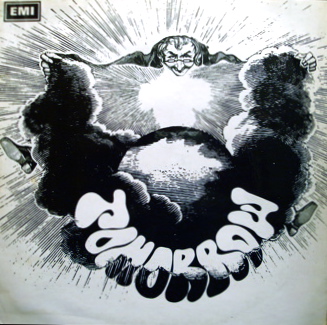 Tomorrow featuring Keith
West (1968),
***
Tomorrow featuring Keith
West (1968),
***
I'm
sure people are rolling their eyes and remarking, "Oh no,
another way obscure 60s album by some obscure group that went
nowhere." No, not exactly, and believe it or not,
I've found two different re-releases of this album in used CD
stores. Along with The
Soft Machine and Pink
Floyd, Tomorrow
was part of the underground triumvirate that gets mentioned all over
the All Music Guide. However, Tomorrow's main claims to fame
were its members. Tomorrow's singer Keith West, also had a
big
solo hit with "Excerpt From a Teenage Opera" (one of a
billion things that claims to have influenced Tommy)
during his stay with Tomorrow. Their drummer was Twink, later
of The Pretty Things
and The Pink
Fairies, not to mention the ill-fated Stars with Syd
Barrett. The guitarist trumps them both - a young
Steve
Howe. Bassist John "Junior" Wood, left the
industry.
Enough of the people, and onto the album itself. Despite
whatever hype the All Music Guide gives it, this album is a broad
representation of psychedelic music styles. The playing is
not
overwhelming and neither are the lyrics. There are backwards
guitars ("My White Bicycle"), Kinks style character
portraits ("Colonel Brown"), whimsy, calls for revolution,
sitar, dwarves - in short, everything that people make fun of
today.
The worst has to be "Shy Boy", a rather annoying portrait
number with calliope organ by producer Mark Wirtz. Despite
these shortfalls, the group had a knack for interesting tempo changes
and abrupt shifts, which prevented them from being a mundane
psychedelic group. "Real Life Permanent Dream" is the
clear winner, with "The Incredible Journey of Timothy Chase"
(despite West's Dylan-influenced intonation) and "Now Your Time
Has Come" and "Hallucinations" also getting the
nod. In conclusion - a clear representations of the strengths
and weaknesses of the time, sadly coming out after the era had pretty
much blown over.
A note on
re-issues. There are evidently two on CD, one from the early
90s on See For Miles. It has the album, plus one B-Side
"Claremont Lake" which is decent and some general Tomorrow
liner notes. The real deal was released on EMI a couple of
years ago. It has a couple of extra tracks, like a cover of
the
Byrds' "Why" and an awesome sitar-less take of "Real
Life Permanent Dream". This disc also includes all three
tracks from Twink and Junior's post-Tomorrow project, The Aquarian
Age, which have to be the most unintentionally hilarious tracks ever:
the instant classic "Good Wizzard Meets Naughty Wizzard".
It also has a good chunk of West's solo tracks, recorded with Howe,
Ronnie Wood and Aynsley Dunbar (who overplays the hell out of the
songs). The catch is that it may not be sold in the
US.
 Yes
(1969),
***1/2
Yes
(1969),
***1/2
This
record is undeservedly but understandably overlooked often in Yes's
catalog, probably due to the fact that this is not prog-rock.
Yes
is
more analogous
to Cheerful
Insanity than
In
the Court of the Crimson King,
except that Yes were a lot more mainstream. In fact, Yes
might
have been the most technically accomplished pop-rock group around,
albeit one with a large jazz bent (especially in Banks and Bruford's
playing). Everything on this album has a light touch, even
when
they rock. For example, the opening track "Beyond and
Before" combines catchy hooks, vocal harmonies with excellent
playing by all. (Amazing that it was never released as a
single.) This pervasive feeling results in stately music,
like a
fun colorful procession in each track. There are a couple of
soft folky love ballads ("Yesterday and Today" and
"Sweetness"), as opposed to Yes's later verbal
abstractions. What is really surprising is how tight the band
sounds, as Banks and Kaye are essential to the sound. Kaye is
not flashy, and sticks mainly to organ, but he transforms a song like
"Harold Land" into organ-dominated grandeur, and plays
plenty of memorable lines all over the place. Banks is also
important, demonstrating a noticeable Byrds
influence - most apparent in the cover of that group's "I See
You" where he cribs McGuinn's "Eight Mile High" tone
for parts (and also approaches prog territory during his long,
slightly noodly jazz solo). Finally, "Survival" is
also fantastic from the pingy slightly wah-wahed bass intro and
gradual phasing out of the opening riff, to the building relaxed song
that gradual builds up. So, while this album is not really
progressive, it is an interesting take on pop which is mostly
successful. Produced by Paul Clay and the group, and I have
no
idea who Paul Clay was.
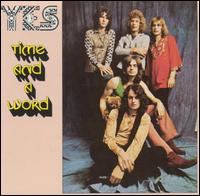 Yes:
Time
and a Word (1970),
**1/2
Yes:
Time
and a Word (1970),
**1/2
Whoa,
whoa, whoa boys - suddenly we're all progressive. Yes
certainly had its
complex
moments, but on Time
and a Word they
go
beyond being a very well versed pop group. However, the first
thing one will notice is the superfluous orchestra strings, which
mostly reiterate someone's musical line or bury the soloists.
There also seems to have been a deliberate attempt to drop Yes's
saccharine image through burying most of the harmonies, dropping
folky stretches, and then smothering the sound with strings whenever
the band tries to be quiet and romantic ("Clear Days" is
unwillingly transformed from piano and vocals into a chamber
piece). Tony Colton's production choices are
baffling at
other points as well - "underwater" vocals, spreading the
channels as far apart as possible or compressing the band to mono for
the orchestra. He does get one song right--the heavy sound on
"Sweet Dreams" puts the bass and drums up front for a
power-pop masterpiece. As for being progressive, Kaye gets a
very long leash in terms of his song intros ("The Prophet"),
solos and general playing. The arrangements have gotten
rather
complicated indeed, and many songs feature a fast-paced instrumental
core where the band lets out all that pent up classical/jazz energy
("Then"). Banks gets his jazzy chops in on the
electric 12-string (Buffalo Springfield's "Everydays"),
while Squire and Bruford are unbeatable when they team up on
instrumental passages. The songwriting is weaker than before
-
it's still romanticism and good feelings (mainly by Anderson) and
often quite beautiful when the arrangements do not get in the way
("Then", the fantastic title track). Fans of the
previous album may enjoy it, but go there first.
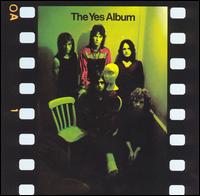 Yes:
The Yes
Album (1971),
****
Yes:
The Yes
Album (1971),
****
Taking a more pop approach to prog-rock with vocal
harmonies, energetic playing and catchy refrains than other groups
like ELP, Yes hit its stride with this album. A
Beatle-like approach to jazz?
Perhaps. New
member Howe
plays boisterously throughout ("Yours is No Disgrace", e.g.) and
demonstrates his ability to play live with a brief
acoustic solo "The Clap". He certainly learned a lot since
Tomorrow. Squire and
Bruford are a perfectly synched rhythm section. Kaye provides
additional support, with his
fat-Hammond sound providing an underpinning for the movement above it
("All Good People"), although he loses his soloing time to
Howe. The songs are fairly short and shift often enough to
not
lose momentum. Only the last two numbers, "A Venture"
and "Perpetual Change" are misfires, the latter dragging
and not justifying its length. Produced by Yes and Eddie
Offord.
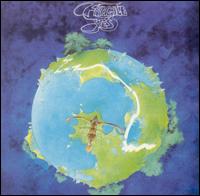 Yes:
Fragile
(1972),
****1/2
Yes:
Fragile
(1972),
****1/2
With
Rick Wakeman replacing Tony Kaye, Yes had an awful lot of virtuosos
on hand. The group put Fragile together quickly to pay for
Wakeman's electronic toys, but a rushed pace is hard to
discern. The band came up with
shorter individually written experimental pieces and longer, layered
group songs. For example, the big hit from this
record was "Roundabout", which took the multi-sectioned
format of songs from their previous album, but added greater
interplay between the various instruments. Another example is
"South Side of the Sky", which veers from sounding a lot
like The Yes Album
to softer
piano and vocals
sections, while Bruford quietly goes crazy on his drums. The
individual pieces are also fascinating - especially Squire's "the
fish" which consists a bass overdubbed beyond belief with drum
accompaniment, or Anderson's "We Have Heaven", which is
just him overdubbed onto himself as well. Ironically, only
Wakeman's "Cans and Brahms", a short classical piece with
all the parts played on synths, prevents the album from getting a
full five-star rating because it sounds incredibly dated.
Finally, the other group pieces are the best of the bunch.
"Long Distance Runaround" has a spectacular shared
guitar/keyboard line and is syncopation like a madman, while "Heart
of the Sunrise" has multiple rhythms and themes, sometimes
sounding like "21st Century Schizoid Man" and then quiet
and majestic. Absolutely fascinating. Produced by
Yes and
Eddie Offord again.
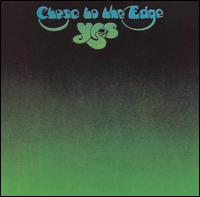 Yes:
Close to
the Edge (1972),
***1/2
Yes:
Close to
the Edge (1972),
***1/2
With
more time in the studio, Yes returned to longer suite-formatted
pieces. The entire album is three songs, so I might as well
name them now - the title track, "And You and I" and
"Siberian Khatru". Musically, there is little
advancement beyond Fragile,
but
Close
to the Edge has
a more layered approach. For example, the band plays around
with so-called "underwater vocals" and Wakeman introduces
an almost ambient intro/outro to the title track. Wakeman was
more subdued than some of his
contemporaries,
contributing background synths and mellotrons, but he does break out
with a good run now and again. Howe really is in more of the
forefront, leading "And You and I" with his 12-string, and
more solo lines in the album. Again, there are vocal harmony
parts, actually better than Fragile
in
parts ("I Get Up I Get Down"). Only "Siberian
Khatru" doesn't get very good marks, relying too much on one
motif. Finally, for some reason Anderson's habit of actually
pronouncing the ending sounds of words is rather noticeable on the
record. Produced by Eddie Offord and the group.
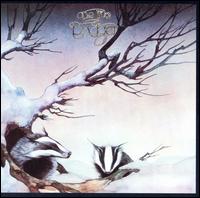 Badger:
One
Live Badger (1973),
**1/2
Badger:
One
Live Badger (1973),
**1/2
Ever watch a
game show and see the lousy consolation prizes that losing
contestants get? Here's the consolation prize for ex-Yes
keyboardist Tony Kaye! Some people associate the word
"progressive" with this album, which may seem fitting as
this gets a full-fledged Yes step-child treatment - Roger Dean cover
art, a sneaky inclusion of the one of Dean's Yes motifs on the
inside, and co-production by Jon Anderson. But despite Kaye's
presence, and bassist David Foster (who co-wrote part of Time
and a Word with
Anderson), One
Live
Badger is not
progressive rock. That is, unless by "progressive"
you mean hard rock with keyboards and occasional mellotron or synth
lines, placing them further out than Greenslade's debut at their most
rocking. This is not to say that it this album is not
entertaining in its limited way. Guitarist Brian Parrish is
fairly quick at the pentatonic scale, making him one of those mildly
respectable players, and Kaye was certainly no slouch either.
However, the songs themselves are underwritten, with plenty of
repetition ("Wind of Change") and long running times (five
out of six tracks are over seven minutes long, giving room for
soloing), even when their choruses are nice ("Fountain" or
the best of the lot "Wheel of Fortune"). Their
soul/blues sound is pretty rote, along with their average and skimpy
lyrics ("Preacher" is about a drunk preacher, but don't
worry - he's found God!, or "On the Way Home" which is
gospel-rock). There isn't much interplay between Parrish and
Kaye, and once you figure that Foster's bass playing is boring and
the only thing that drummer Roy Dyke does is change his fills there's
no reason for repeat listens. About the only interesting this
the band decision to release a live album (recorded at the Rainbow
Theatre the previous December) for their debut. Produced by
Anderson, Geoffrey Haslam and the group.
Yes:
Yessongs
(1973)
A live triple album.
I have
it, but I'm not likely to review it soon, mostly because it is a
triple album. At least they didn't have George Harrison's
penchant for releasing them.
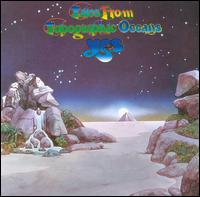 Yes:
Tales
from Topographic
Oceans (1973),
*1/2
Yes:
Tales
from Topographic
Oceans (1973),
*1/2
This is a whole lot
of Yes - four sides worth. If warning lights are going
off in your head about prog-rock indulgence, stay away. After
the addition of Wakeman, the band had been getting more symphonic,
which started to work against them. Each song is twenty
minutes long, for which the band stretched themselves too
much. Tales'
real problem is that there are not enough musical ideas to fill the
space (lack of melody, anyone?), resulting in repetition and
annoyingly slow tempos. Even worse, Anderson and Howe based
the
lyrics on some mystical texts which encompass "religion, and
social life, as well as fields like medicine and music, art and
architecture," writing vapid phrases without meaning.
The music can be roughly divided based on the album's four sides -
the first ("The Reveling Science of God") is Anderson's,
the second ("The Remembering") is Wakeman's, the third
("The Ancient") is Howe's, with Squire and White getting
episodes during the fourth ("Ritual"). The album
opens with "The Revealing Science of God", and the first
thing that one notices is the sheer amount of words in this song (for
a Yes track). It is a waste except for a few
moments. The
next ("The Remembering") has less words, and instead relies
on lush mellotron passages to bridge between repetitions of the same
motif. It is almost like a Mike Oldfield song with lyrics and
slowed down. You keep waiting for the intro to end, until you
realize that this is the song. (Oldfield shifts the music
much
more, and I don't want to insult him). "The Ancients"
sticks out in my mind for two reasons. First, Howe uses the
most annoying guitar tone in the beginning (more Oldfield-like
background) and plays without any real energy. The track does
have a nice classical guitar section, but that's about it. I
do
not have much to say about "Ritual", except that White's
solo part is uninteresting, and Wakeman actually uses a cheesy synth
sound for it. Overall, Yes experimented with Tales,
but it seems old hat (various percussion parts, wah-wah bass,
backwards piano). If you combined all the good parts, you
could
come up with one side at best. Wakeman left after this
album.
As for Alan White, he is decent, but less spontaneous than
Bruford.
Produced by Yes and Eddie Offord.
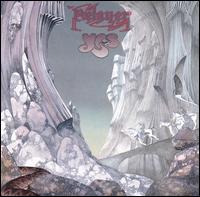 Yes:
Relayer
(1974),
**1/2
Yes:
Relayer
(1974),
**1/2
A lot of fans love this album, but I find it often
tedious. The
group's taste for long compositions was never a problem when they had
enough talent and good melodies to back it up, but when the well ran
dry Yes became boring. Case in point - "Gates of
Delirium", which runs close to 22 minutes and contains less
musical ideas than "Close to the Edge" (the song, not the
album). Make no mistake, with Wakeman gone this album is
about
Howe, but he seems content to just play scales or repeat
himself.
Wakeman's replacement, Patrick Moritz (formerly of
the Nice reconstruction Refugee),
likes
busy background noises, annoyingly cheesy synths (80s video game
style) and boring solo lines. To return to "Gates",
everything is extended too long-- from the intro to the strange
destructive noises in the middle. Not to leave out the ending, which
sounds like somebody attempting to rip off the third part of "Close
to the Edge", and features lots of Howe's reverb-laden
guitar.
The lyrics are mystical, political and crap. Of far more
interest is "Sound Chaser"; essentially a mid-70s fusion
workout Yes style, it has weird vocal sections, and a boring Howe
scale part. Finally, "To Be Over" sounds really
relaxed and different (slide guitar, wow!), but then starts to drag
(having the same vamp the entire song will do that). Alan
White's drumming is inferior to Bruford's, but respectable. Many Yes
fans love this album, so if you cannot get enough Yes, go for it.
Yes:
Yesterdays
(1974)
A collection of
tracks from the first two pre-Howe albums, with the exception of a
long (ten+ minutes) rendition of Paul Simon's "America".
The only other non-album track is "Dear Father" the B-side
to "Sweet Dreams" and both are now bonus tracks on album
re-releases. The only reason to own this is if you are
obsessive about Roger Dean cover art.
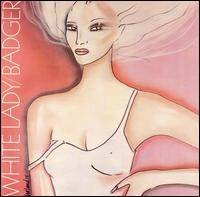 Badger:
White
Lady (1974),
***
Badger:
White
Lady (1974),
***
This
is the least Yes-sounding album on this page, as Badger went
full-tilt into soul. Parrish and Foster left the group, and
were replaced by one-time Apple records artist Jackie Lomax (vocals,
guitar), former Steeler's Wheel guitarist Paul Pilnick and bassist
Kim Gardner. Lomax is White
Lady's
key figure; he not only writes all the songs, but has a fine smooth
soul voice. Allen Toussaint recorded the album in New
Orleans,
and he gave the band the full contemporary R&B/soul sound -
horns, backing singers, prominent rhythm section. Unlike One
Live Badger or
other English bands who explored American soul (Clapton or Traffic at
times), Badger was far more interested in grooves than soloing (or
even soloing over the grooves). Dyke and Gardner usually
kickstart the tracks with a catchy rhythm ("Don't Pill the
Trigger"), then Lomax swoons in, while everyone plays along.
Pilnick sticks to rhythm , so they brought
in Barry Bailey in on slide, with an appearance by Bryn Haworth as
well. There are a few nods towards the Allman Brothers intertwined
guitars (the ode-to-drugs title track with Jeff
Beck playing lead, "Listen to Me"), but overall White
Lady is
really a group effort. Lomax is almost too low-key at points,
and when he gets excited he has a tendency to get frog-voiced, but he
is still the focal point. But this is about the grooves, and
in
conjunction with the excellent production they have plenty (the
opening "A Dream of You" is great, "Be With You",
"Lord Who Give Me Life"). Quite the guilty pleasure
as such, but it failed to chart and the group broke up soon
afterwards. Kaye subsequently joined Badfinger.
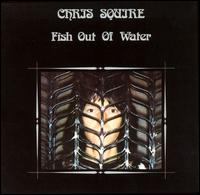 Chris
Squire: Fish
Out of Water (1975),
***
Chris
Squire: Fish
Out of Water (1975),
***
This
isn't really a three-star record, but it is better than Relayer.
As with any band members' first solo album,
it is worth it to look and see the supporting people identities and
numerousness. On Fish
Out of Water,
Squire worked with Yes alumnus Bruford and Moraz, but mainly with
pianist/conductor Andrew Pryce Jackman from his old pre-Yes group the
Syn. I like Squires' approach, but he makes some familiar
mistakes. His vocals are obscured, like he is singing backup,
and his accent throws you in places. But the most surprising
thing is the vaguely hymn-like feel in some songs ("You By My
Side", the church organ augmented "Hold Out Your Hand").
The second most unexpected thing is the orchestra which appears on
about half the record. Its role varies from passages that
sound
like they belong on Days
of Future Passed (the
intro to "Silently Falling"), to interplay with the band
("Safe (Canon Song)"). But the longer tracks go on to
long and get too repetitious, especially the canon parts.
"Silently Falling" also manages to take a good Jimmy
Hastings line, a cool Yes-like jam middle and turn it into a
repetitious, boring ending. However, Squire does come up with
one truly classic song - "Lucky Tonight". It's moody,
it's slick and it has a great sax line from Mel Collins.
Gosh,
it's unexpectedly almost like a Pink
Floyd
track. Yes, Squire does contribute some 12-string guitar in
addition to his excellent bass work, but it is nothing
special.
Self-produced.
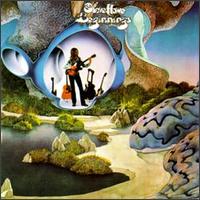 Steve
Howe: Beginnings
(1976),
***1/2
Steve
Howe: Beginnings
(1976),
***1/2
From
the Roger Dean artwork, down to the Yes logo on the inside and a
discreet placing of their symbol, it is obvious that Beginnings
was designed to
cater to Yes
fanatics going through withdrawal. Sure, this could be Yes,
if
Yes didn't have Anderson and wrote more folky, pop material.
Not like it was any big secret that Howe was always a classical and
folk man. But there is no way this album should be this
good.
I mean: Steve Howe? Steve
Howe?
When I
saw Yes a few years ago the guy stood on an oriental rug
onstage!
He always struck me as being fussy, like the sort who spends hours
adjusting their furniture in accordance with Feng Shui. Lest
his memory be dominated by some less than stellar performances, Howe
is an excellent guitar player as long as he could reign it
in.
But did you know that Steve-O could loosen up as well? Well,
not enough to pry him away from his little guitar runs, but enough to
surprise the rest of us. On Beginnings,
Howe keeps the running times down, applies his tolerable vocals to
suitable romantic/pastoral lyrics, and succeeds ("Doors of
Sleep", "Will O' The Wisp"). As with most solo
debuts, the songs cover a wide range within the
progressive/classical/traditional world, such as the fine
folk/classical instrumental with Howe playing with members from
folk-prog group Gryphon ("The Nature of the Sea").
Similar to Squire, Howe does include a long neo-classical work (the
title track), but it is more of a chamber piece than Squire's similar
work. It starts out pleasantly with Howe doing his usual
Julian
Bream classical thing, but he soon gets drowned out by Moraz's
orchestrations, which is a shame. Howe's tastes do
not
quite run the gamut, but the album is a good mix of things like
"Ram", a nice country rag where a kazoo would have fit in
nicely, and the rocking "Break Away From It All".
However, the most astonishing track on here is "Lost Symphony",
which is somewhere between a jam and structured song.
Essentially Howe writes a nice intro, comes up with a beat to which
you could easily find yourself dancing, and then proceeds to trade
off solo lines with the session horns. It is a blast, and a
completely unexpected one. Granted, there is some filler
("Australia", the unenergetic "Pleasure Stole the
Night"), but all in all this is an impressive debut, showing
that Howe had talent, taste and some
self-restraint. The
personnel is mainly a mix of Yes fellows (White, Bruford, Moraz), the
aforementioned Gryphon members, and lot of Howe overdubbing guitars
and bass (he even borrows some of Squire's phrasing now and again, as
on "Will O' The Wisp"). Produced by Howe and Eddie
Offord.
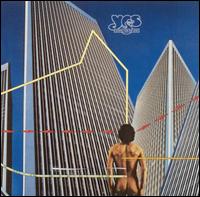 Yes:
Going
for the One (1977),
**1/2
Yes:
Going
for the One (1977),
**1/2
Back before
they were popular, Yes was a normal band playing songs with normal
lengths and the like on their debut. Going
for the One attempts
to return to the band to a more mainstream rock sound, even though
mainstream rock bands were about to get pummeled. Regardless,
the album
is a much more accessible than Relayer.
Wakeman is back, and up to his old background noises and church organ
(although he employs an annoying polymoog sound on
"Wondrous Stories"), and Howe's playing is more
interesting than on the past couple of albums. The album's
friendly sound is largely the work of the title track, a sort of
prog-pop number with Howe's slide guitar propelling it in an
uncharacteristically cool way. The other songs are also genre
exercises - a painfully slow classical-guitar piece which suffers
from contemporary production, including some cheesy synth backing
("Turn of the Century"), regular rock (Squire's "Parallels"
which sounds like an outtake from Fish
Out of Water,right
down to the church organ), folk ("Wondrous Stories") and
their own longer format (the spiritual/metaphysical "Awakening"
which keeps the same motif throughout, becomes predictable, yet is
still better than anything on Tales).
Yes had a good sound, but still came up short in the hook department
("Turn of the Century"), and their lyrics are either
ambiguous or bad. But Going
for the One is not a
bad album, merely bland. Self-produced.
Yes:
Tormato
(1978),
*1/2
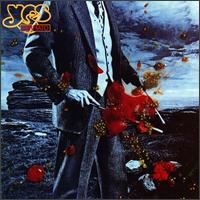 Yes, as the cover
demonstrates, a tormato is a tomato + a tornado. Tormato
continues Going for the
One's
rococo pop streak - shorter songs, classical furnishings, glittering
production, and some bad lyrics. At this point Yes was
essentially a group of dads, and Anderson, the primary lyricist,
focused on topics befitting a man at his stage in life: children's
tales ("Circus of Heaven"), ecology ("Don't Kill the Whale") and vague
New
Age pronouncements ("On the Silent Wings of Freedom"). Still,
these are nothing next to the moonshot
of awfulness and hilarity which is "Arriving UFO". This track
opens
the second side with the lines "I could not take it oh so seriously
really / When you called and said you'd seen a UFO" - a stunning line
from the
gentleman responsible for Tales
from Tedious Bullshit. Oh, Jon Anderson, who
can take you
seriously with such silly lyrics. It's a pity,
really, as the band's musical talent still flowed forth - they
keep things moving, usually avoiding repetitive instrumental sections,
even if the sections/riffs themselves are not great. Squire
seems to shine brightest - his bass leads some of the better tracks (the excellent
opening to "On the Silent Wings of Freedom" for example) and the band's
usual "music as complicated aural spectacle" approach succeeds at least
once with "Future Times". But for every pretty good song, like
the
rocking "Release, Release" with a baffling drum solo, Tormato has
clunky exercises like "Madrigal" or Squire's plodding ballad "Onward".
The band still had plenty of musical ideas - Wakeman was
playing
around with the birotron,
for one -
but all the gloss cannot stitch together the album and compensate for
the clunkers. An ugly Faberge egg. Self-produced.
Yes, as the cover
demonstrates, a tormato is a tomato + a tornado. Tormato
continues Going for the
One's
rococo pop streak - shorter songs, classical furnishings, glittering
production, and some bad lyrics. At this point Yes was
essentially a group of dads, and Anderson, the primary lyricist,
focused on topics befitting a man at his stage in life: children's
tales ("Circus of Heaven"), ecology ("Don't Kill the Whale") and vague
New
Age pronouncements ("On the Silent Wings of Freedom"). Still,
these are nothing next to the moonshot
of awfulness and hilarity which is "Arriving UFO". This track
opens
the second side with the lines "I could not take it oh so seriously
really / When you called and said you'd seen a UFO" - a stunning line
from the
gentleman responsible for Tales
from Tedious Bullshit. Oh, Jon Anderson, who
can take you
seriously with such silly lyrics. It's a pity,
really, as the band's musical talent still flowed forth - they
keep things moving, usually avoiding repetitive instrumental sections,
even if the sections/riffs themselves are not great. Squire
seems to shine brightest - his bass leads some of the better tracks (the excellent
opening to "On the Silent Wings of Freedom" for example) and the band's
usual "music as complicated aural spectacle" approach succeeds at least
once with "Future Times". But for every pretty good song, like
the
rocking "Release, Release" with a baffling drum solo, Tormato has
clunky exercises like "Madrigal" or Squire's plodding ballad "Onward".
The band still had plenty of musical ideas - Wakeman was
playing
around with the birotron,
for one -
but all the gloss cannot stitch together the album and compensate for
the clunkers. An ugly Faberge egg. Self-produced.
Yes:
Drama (1980), ***
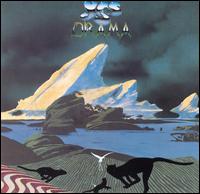 The
"drama" may refer to the band's membership - Anderson
and Wakeman both left for solo work. The Buggles duo of
Trevor
Horn and Geoff Downs replaced them; a fact which is supposed to shock!
you, as they were a successful New Wave duo, not elderly prog-rock
castoffs. The
change helped: the band sounds more focused than they had in several
years, although perhaps it was only improvement through reduction.
Most
of Yes's elements are the same - they still have long epic tracks, with
less complicated arrangements, while Downes and Horn generally defer to
the other band members. Where Wakeman played the hell
out
of multiple instruments, Downs supports rather than competes with the others, and
uses a lot of warm and friendly synthesized tones. Nor does Trevor
Horn stand out as much as Anderson; Horn's
voice sounds a bit like a better version of Squire's. It's no secret that the band had been trending poppier for
years,
but while certain things (the production, the sophisticated
pop
language lyrics) are certainly easier to receive, the band's sound has
tightened back to their mid-70s peak. Drama opens with "Machine Messiah" in form a long,
shifting
piece as you would expect from Yes, but the tone has changed.
Instead of Anderson's mysticism or goofy sentimentalism, it
has
almost a Japanese cartoon feel - the lyrics reflect the title (technology!) and the
playing is brightly colored. Sometimes it is the unexpected
arena-rock
opening to "Does It Really
Happen?", or maybe Squire's incredibly catchy bass line in "Tempus
Fugit" which catch the ear. Certainly, the band sounds
alive and after you sort through various middling songs, almost
everything has a spark. .The
album does have its weak spots: "White Car" is a brief,
fake symphonic piece about a man in a white car (an experiment
oddly reminiscent of Fragile's "Cans and Brahms") and more time is
wasted on what is presumably another Squire ballad ("Run Through the
Light"). But aside from those clunkers, the band was both moving, and
in
the right direction; a progression halted when they broke up after this album.
The
"drama" may refer to the band's membership - Anderson
and Wakeman both left for solo work. The Buggles duo of
Trevor
Horn and Geoff Downs replaced them; a fact which is supposed to shock!
you, as they were a successful New Wave duo, not elderly prog-rock
castoffs. The
change helped: the band sounds more focused than they had in several
years, although perhaps it was only improvement through reduction.
Most
of Yes's elements are the same - they still have long epic tracks, with
less complicated arrangements, while Downes and Horn generally defer to
the other band members. Where Wakeman played the hell
out
of multiple instruments, Downs supports rather than competes with the others, and
uses a lot of warm and friendly synthesized tones. Nor does Trevor
Horn stand out as much as Anderson; Horn's
voice sounds a bit like a better version of Squire's. It's no secret that the band had been trending poppier for
years,
but while certain things (the production, the sophisticated
pop
language lyrics) are certainly easier to receive, the band's sound has
tightened back to their mid-70s peak. Drama opens with "Machine Messiah" in form a long,
shifting
piece as you would expect from Yes, but the tone has changed.
Instead of Anderson's mysticism or goofy sentimentalism, it
has
almost a Japanese cartoon feel - the lyrics reflect the title (technology!) and the
playing is brightly colored. Sometimes it is the unexpected
arena-rock
opening to "Does It Really
Happen?", or maybe Squire's incredibly catchy bass line in "Tempus
Fugit" which catch the ear. Certainly, the band sounds
alive and after you sort through various middling songs, almost
everything has a spark. .The
album does have its weak spots: "White Car" is a brief,
fake symphonic piece about a man in a white car (an experiment
oddly reminiscent of Fragile's "Cans and Brahms") and more time is
wasted on what is presumably another Squire ballad ("Run Through the
Light"). But aside from those clunkers, the band was both moving, and
in
the right direction; a progression halted when they broke up after this album.
 Tomorrow featuring Keith
West (1968),
***
Tomorrow featuring Keith
West (1968),
***
 Yes
(1969),
***1/2
Yes
(1969),
***1/2
 Yes:
Time
and a Word (1970),
**1/2
Yes:
Time
and a Word (1970),
**1/2  Yes:
The Yes
Album (1971),
****
Yes:
The Yes
Album (1971),
****
 Yes:
Fragile
(1972),
****1/2
Yes:
Fragile
(1972),
****1/2  Yes:
Close to
the Edge (1972),
***1/2
Yes:
Close to
the Edge (1972),
***1/2
 Badger:
One
Live Badger (1973),
**1/2
Badger:
One
Live Badger (1973),
**1/2 Yes:
Tales
from Topographic
Oceans (1973),
*1/2
Yes:
Tales
from Topographic
Oceans (1973),
*1/2
 Yes:
Relayer
(1974),
**1/2
Yes:
Relayer
(1974),
**1/2
 Badger:
White
Lady (1974),
***
Badger:
White
Lady (1974),
*** Chris
Squire: Fish
Out of Water (1975),
***
Chris
Squire: Fish
Out of Water (1975),
***
 Steve
Howe: Beginnings
(1976),
***1/2
Steve
Howe: Beginnings
(1976),
***1/2 Yes:
Going
for the One (1977),
**1/2
Yes:
Going
for the One (1977),
**1/2 
